Cross-Cultural Communications (CCC) has licensed over 500 trainers — and counting — across health systems, school districts, nonprofits, and government agencies in 44 U.S. states, Washington, D.C., Guam, and six other countries. Our Training of Trainers sessions offer you the guidance and resources you need to teach our programs.
The CCC license gives you a deep discount on Culture & Language Press textbooks and manuals. Plus you’ll automatically receive updated editions of the trainer’s guides.
After licensing, you’ll gain access to our Licensed Trainer Site and a whole host of resources designed to help you drastically move language access and interpreter training forward at the organization(s) you work with.
Trainers gain access to all the presentations, lessons plans, activities, videos, resources, etc. to effectively train interpreters. We regularly add new resources to the trainers site and periodically hold refresher trainings on our new and existing material. We partner with our trainers to help them move language access forward at their respective institutions.
“Thank you so much for the [CCC licensed trainer] dinner and lovely opportunity to meet other trainers. I truly value CCC and the amazing resources and support you provide for trainers. This is such important work and I am honored to be a trainer for this curriculum. ”
Erika Shell Castro, Director Patient Advocacy and Compliance, Cloudbreak Health, Licensed TCI Trainer


“This (The Community Interpreter® International: Training of Trainers) has been the most engaging and vibrant training I have ever taken and I have been around for quite some time! Thank you very much CCC team!!!!”
Sandra Henry-Álvarez, Freelance Certified Court and Medical Interpreter, Boston, Massachusetts
We welcome individuals and organizational representatives to our training of trainers sessions. Individuals do not need to be sponsored by an organization. Rather, all participants must meet certain criteria in order to attend a CCC TOT program.
Candidates who meet the following criteria are eligible to attend our interpreting TOTs:
College degree (four-year undergraduate degree or master’s degree)
Language proficiency in at least two languages
Completion of a minimum of 40 hours of interpreter training
Interpreting experience
Adult education or teaching experience
Candidates who meet the following criteria are eligible to attend our cultural competence TOTs:
College degree (four-year undergraduate or master's degree)
Adult education or teaching experience
Please note that candidates are required to submit their resume and documentation supporting the above criteria.
In the event that not all criteria are met, a screening phone call may be requested between the candidate and CCC. To request your screening phone call, email us your resume and all supporting documentation under the subject heading "Request for TOT Screening Call".
Whoever pays the TOT course fee will be eligible to sign a licensing agreement upon a participant's successful completion of a TOT program.
If a course participant pays the TOT fee, the participant will be eligible to become the licensed agency (i.e. licensee) on the licensing agreement. The participant will also appear on the agreement as the licensed trainer.
If a participant's TOT course fee is paid by an organization, the organization will be eligible to become the licensed agency and the course participant will appear on the agreement as the licensed trainer. In this instance, the licensed trainer could only use the licensed materials under authorization from the licensed agency.
The license, renewable in 10 year intervals, is signed between CCC and the licensed agency upon successful completion of a TOT program. You can request a copy of our boilerplate licensing agreement.
At CCC we do not charge licensing fees or renewal fees, ever!
For certain programs, we require licensed agencies to purchase class sets of course books (one copy per participant) directly from us -- at steeply discounted prices.
The Community Interpreter® International
Required course books: one copy of The Community Interpreter®: An International Textbook or The Medical Interpreter per participant. (The Community Interpreter®: An International Workbook is optional but most licensed agencies purchase it as well.)
Medical Terminology for Interpreters
Required course book: Medical Terminology for Interpreters
The Language of Justice
Required course books: The Language of Justice: A Training Manual and The Language of Justice: Exercises and Role Plays
Cultural Competence in Health and Human Services
Required course book: none
Licensed trainers who complete CCC training of trainer programs have access to steep discounts on retail rates for certain books and products to support their training sessions. For example:
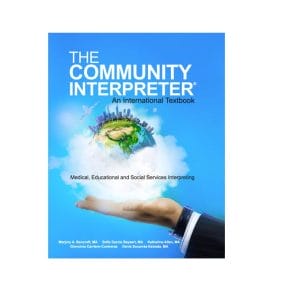

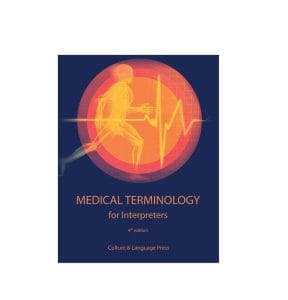

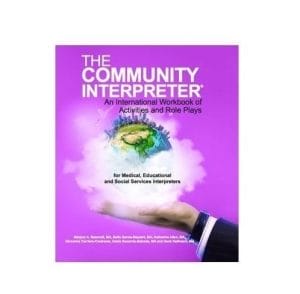

TOT participants will receive one print copy (unless otherwise noted) of the following materials:
The Community Interpreter ® International TOT
The Community Interpreter® International: An Instructor's Guide (not sold separately)
The Community Interpreter®: An International Textbook
The Medical Interpreter: A Foundation Textbook for Medical Interpreting
The Community Interpreter®: An International Workbook (accompanies either textbook)
Medical Terminology for Interpreters
Medical Terminology for Interpreters: An Instructor's Guide (PDF provided after licensing)
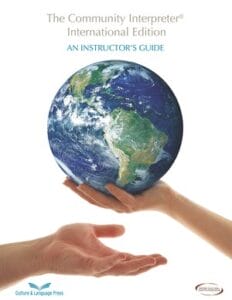
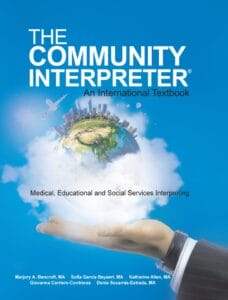
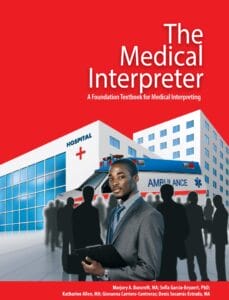
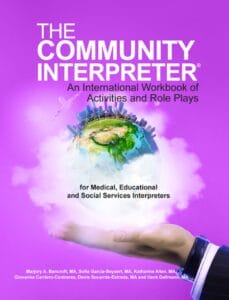
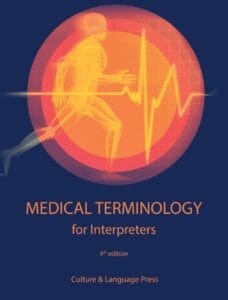
Medical Terminology TOT
Medical Terminology for Interpreters
Medical Terminology for Interpreters: An Instructor's Guide
The Language of Justice TOT
The Language of Justice: A Trainer's Guide (not sold separately)
The Language of Justice: A Training Manual
The Language of Justice: Exercises and Role Plays
Cultural Competence TOT
Cultural Competence in Health and Human Services: A Trainer's Guide
After licensing, CCC licensed trainers receive even more training goodies -- at no additional cost!
Professionally designed slide kits (PowerPoint format)
Electronic activity handouts
Templates for course certificates and evaluation forms
Editable fliers to promote your training sessions
One complimentary listing per trainer on TCITrainer.com
Subscription to our monthly e-newsletter TCI On The Move
Lifelong support from CCC (Yes, we mean it!)
Yes, CCC licensed trainers are authorized to use our company logo on their promotional materials and training certificates so long as the logo is accompanied this phrase: A program of Cross-Cultural Communications.
To become an interpreter, you must be at least 18 years old, possess a high school diploma or equivalent, and be bilingual. Since we're based in the United States, where English is the primary language of service, one of your working languages must be English. Increasingly, the industry standard requires interpreters to have completed a 40-hour certificate program, at a minimum, before being able to work as an interpreter.
CCC recommends that participants first strengthen their non-native language before taking our programs. Some options for language training are: community colleges, online programs such as Rosetta Stone, conversation groups (such as free groups sponsored by public libraries), etc.
Interpreting is an expanding sector of the job market due to several factors. There is a high percentage of foreign-born people in the U.S. seeking access to publicly funded services such as health care, social services and education. Under Title VI of the Civil Rights Act (signed in 1964) any organization receiving one dollar of federal funding must not discriminate on the basis of national origin and must make reasonable efforts to provide this access. Therefore, if a public school system serves a large Korean population they must provide Korean interpreting (and translation) services free of charge. Health care organizations are increasingly using medical certified interpreters after several high-profile medical malpractice lawsuits resulted from either no interpreter being present or untrained bilingual staff or family members being used to interpret.
It depends on the type of interpreting you’re doing and what type of interpreter you are. In general, there are three types of interpreters, volunteer interpreters (such as those who interpret at places of worship or at clinics for low-income patients), bilingual staff (employees such as nurses, case workers and psychologists who are asked to interpret in addition to their main job) and contract/freelance interpreters. Contract interpreters typically work for several organizations, either directly with the client or through a language agency. They drive to different locations and pay varies according to the assignment and employer. At the moment, local public school systems tend to pay on the lower end of the interpreting scale, while pay will be higher for medical and legal interpreters and highest of all for certified medical interpreters and court-certified interpreters.
Medical certified interpreters have passed one of the two national certification exams (see below). They have different formats but both are equally valid and accepted. Only certain languages are available at the moment (such as Spanish and Mandarin) but others are in development. Among current pre-requisites is 40 hours of medical/health care interpreter training. The best way to get information about how to prepare for medical interpreter certification is to go to the websites of the two national medical interpreter certification programs:
CCHI at http://www.healthcareinterpretercertification.org/
NBCMI at http://www.certifiedmedicalinterpreters.org/
Court certified interpreters have passed an exam given by a state or federal interpreter certification program. These exams usually have extremely low pass rates. At the federal level, only Spanish is currently offered. Certification exams vary at the state level for other languages.
A certificate is awarded upon successful completion of an academic or non-academic program. For interpreter training programs, language proficiency testing may or may not be a requisite for successful completion of the program. A certification can only be awarded by local, state or federal authorities (such as the community interpreter certification in Washington state; state and federal court certification; and the two national medical interpreter certifications). CCC offers certificate programs.
No, CCC is an organization dedicated solely to interpreter and cultural competence training. Our mission is language access. However, we do provide graduates of The Community Interpreter® with a list of nearby language companies and public organizations that employ interpreters. We also occasionally send out job postings to our program graduates and/or e-newsletter subscribers at the request of other organizations.
Cross-Cultural Communications is the leading international training agency in the U.S. devoted to community interpreting, educational interpreting, healthcare interpreting and cultural competence. It is also the only organization that licenses community interpreters across the U.S. and in other countries. We regularly train bilingual staff as well as contract interpreters. We also provide training and consulting services to private companies, non-profits and government agencies. Our programs are grounded in a mixture of theory and practical, hands-on activities.
The Community Interpreter® International, or TCII, is a 40-hour certificate training program for interpreters who are just starting out or those experienced interpreters who are looking for a recognized qualification. Subjects covered include the interpreting code of ethics and standards of practice in order to give participants a solid grounding in the profession. This is complemented by practical, hands-on activities such as role-plays and interactive group discussions. The program fulfills the 40-hour training requirements considered by many (certifying bodies employers and industry associations) to be the minimum needed to entire the field.
At the moment, a combination of two CCC programs fulfills this requirement: Medical Terminology for Interpreters (7.5 hours) and The Community Interpreter® International. Since TCII is open to all community interpreters and the subject matter covers education and social services as well as medical interpreting, at the end of each TCII session any participant who is seeking medical interpreter certification will be given a letter from CCC, stating the number of hours that can be counted towards this requirement. Typically 34-36 hours count towards the 40 hour requirement.
Yes, although the CE credits offered for each program will vary according to course length and content. Our programs are currently approved for continuing education credits by the following organizations:
Yes…but it’s also so much more! The Community Interpreter® International was designed to address any one of, or all of, three target audiences: medical, educational and/or social services interpreters. Some of our trainers and we ourselves present all-medical sessions that include medical terminology training and others gear their programs to general community interpreting or a specialized audience, like educational interpreting. Our TCII sessions are hosted both in a live online training context and via our self-paced learning platform. They cover medical, educational and social services interpreting.
CCC hosts sessions of The Community Interpreter® International as a live training seasonally. along with many other programs. See our current training offerings.
The Community Interpreter® Online (TCIO) is the self-guided, online version of The Community Interpreter® International and includes open, ongoing enrollment. Learn more about TCIO.
Our licensed trainers also host their own trainings across 44 U.S. states, Washington DC, Guam and six other countries. Search for a trainer near you.
Live online trainings of The Community Interpreter® International currently cost $550.
The course fee includes:
The Community Interpreter Online self-paced course currently costs $390. Sign up here: https://courses.cultureandlanguage.net/ccc_english/the-community-interpreter-online.html
Sessions of The Community Interpreter® hosted by our licensed trainers will vary in cost depending on the location and session.
No. A training program certificate is not the same as certification. In fact, in the U.S. the certificate for a 40-hour training program is a prerequisite to apply for national medical interpreter certification. In The Community Interpreter® we teach you about the difference between a certificate and certification. A good training is the beginning of certification, not the end, because after training you will need to take the written and oral exams of a properly credentialed certification program to become certified.
Intersect is our weekly e-newsletter with breaking news on language, culture and interpreting. Join 20,000+ subscribers in over 100 countries!
We respect your privacy and will not rent, sell or otherwise share your information with third parties.